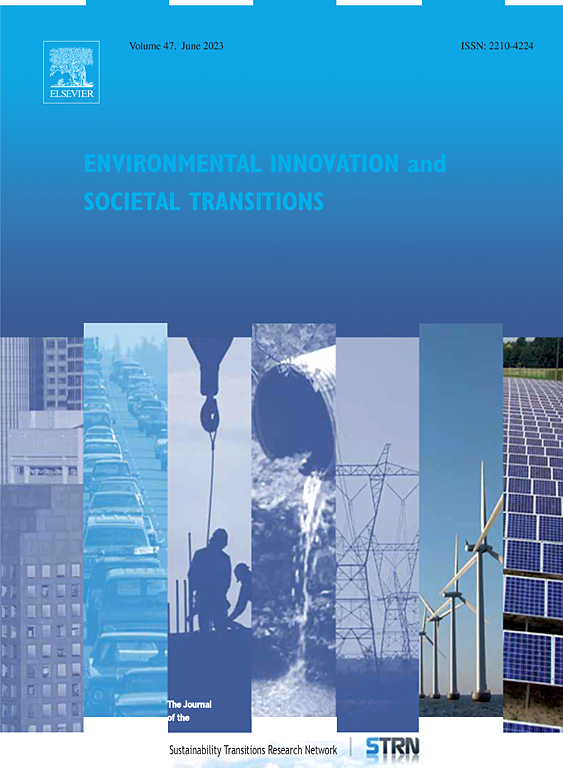Integrating spatial planning and energy policy in The Netherlands: challenges and lessons for societal energy transitions
IF 6.1
2区 经济学
Q1 ENVIRONMENTAL SCIENCES
Environmental Innovation and Societal Transitions
Pub Date : 2025-06-19
DOI:10.1016/j.eist.2025.101023
引用次数: 0
Abstract
Despite The Netherlands' advanced spatial planning system and robust energy infrastructure, attempts to integrate energy policy and spatial planning for energy transition faced significant challenges. This paper examines these efforts and their impact on both systems within nation-wide discussions, using social systems theory to explore why a cohesive strategy failed to emerge. It draws on Luhmann’s theory of social systems and his concept of irritations, combined with a theory-informed thematic analysis, to understand the communications and perturbations between energy planning and spatial planning. The paper argues that the planning and energy systems were unable to adequately understand and coordinate with each other, partly due to the lack of a unifying perspective and the inherent tensions within each system. These challenges hindered the formulation of effective energy transition strategies on a policy level. To distinguish between the degree to which communications of energy planning organizations successfully initiated internal reflections on and revisions of spatial planning organizations’ interests, operations, and priorities, we introduced three types of perturbations, so-called ‘irritations’: incomprehensible, inapt and interpretive irritations. The Dutch experience offers broader insights into the complexities of aligning spatial planning with energy policy in the pursuit of energy transition.
整合荷兰的空间规划和能源政策:社会能源转型的挑战和教训
尽管荷兰拥有先进的空间规划体系和强大的能源基础设施,但整合能源政策和能源转型空间规划的尝试面临着重大挑战。本文在全国范围内的讨论中考察了这些努力及其对两个系统的影响,使用社会系统理论来探讨为什么一个有凝聚力的战略未能出现。它借鉴了Luhmann的社会系统理论和他的愤怒概念,结合理论知识的主题分析,来理解能源规划和空间规划之间的交流和扰动。规划系统和能源系统不能充分理解和协调,部分原因是缺乏统一的视角和各自系统内部的内在张力。这些挑战阻碍了在政策一级制订有效的能源转型战略。为了区分能源规划组织的沟通在多大程度上成功地引发了对空间规划组织的利益、运作和优先事项的内部反思和修正,我们引入了三种类型的扰动,即所谓的“刺激”:不可理解的、不恰当的和解释性的刺激。荷兰的经验为在追求能源转型的过程中将空间规划与能源政策相结合的复杂性提供了更广泛的见解。
本文章由计算机程序翻译,如有差异,请以英文原文为准。
求助全文
约1分钟内获得全文
求助全文
来源期刊

Environmental Innovation and Societal Transitions
Energy-Renewable Energy, Sustainability and the Environment
CiteScore
13.60
自引率
19.40%
发文量
90
审稿时长
56 days
期刊介绍:
Environmental Innovation and Societal Transitions serves as a platform for reporting studies on innovations and socio-economic transitions aimed at fostering an environmentally sustainable economy, thereby addressing structural resource scarcity and environmental challenges, particularly those associated with fossil energy use and climate change. The journal focuses on various forms of innovation, including technological, organizational, economic, institutional, and political, as well as economy-wide and sectoral changes in areas such as energy, transport, agriculture, and water management. It endeavors to tackle complex questions concerning social, economic, behavioral-psychological, and political barriers and opportunities, along with their intricate interactions. With a multidisciplinary approach and methodological openness, the journal welcomes contributions from a wide array of disciplines within the social, environmental, and innovation sciences.
 求助内容:
求助内容: 应助结果提醒方式:
应助结果提醒方式:


